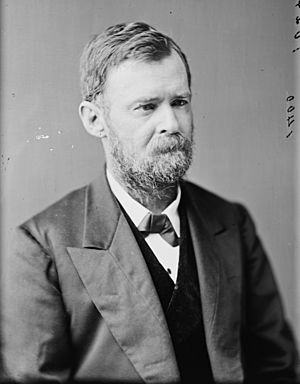William Ephraim Smith facts for kids
Quick facts for kids
William Ephraim Smith
|
|
|---|---|
 |
|
| Member of the U.S. House of Representatives from Georgia's 2nd district |
|
| In office March 4, 1875 – March 3, 1881 |
|
| Preceded by | Richard H. Whiteley |
| Succeeded by | Henry Gray Turner |
| Personal details | |
| Born | March 14, 1829 Augusta, Georgia |
| Died | March 11, 1890 (aged 60) Albany, Georgia |
| Political party | Democratic |
| Profession | planter lawyer |
| Military service | |
| Allegiance | |
| Branch/service | |
| Rank | |
| Unit | |
William Ephraim Smith (March 14, 1829 – March 11, 1890) was an important person from Georgia. He worked as a farmer who owned a large farm (called a planter), a lawyer, and a politician.
Contents
Who Was William Ephraim Smith?
William Ephraim Smith was born in Augusta, Georgia, in 1829. He was a very smart young man. By 1846, when he was just 17, he became a lawyer. This was special because the Georgia government had to make a rule just for him since he was so young.
Early Career and Life
For many years, from 1846 to 1858, William Smith lived in Albany, Georgia. There, he managed his farm and worked as a lawyer. In 1853, he served as an "ordinary" for Dougherty County. This job was like a local judge or official who handled things like wills and elections.
From 1858 to 1860, Smith took on another important role. He became the "solicitor general" for Georgia's southwest area. This meant he was a top lawyer for the state, helping to bring cases to court.
Service During the Civil War
In 1861, the American Civil War began. Even though William Smith did not agree with the idea of states leaving the United States, he joined the army. He became a lieutenant in the Fourth Georgia Volunteer Infantry, fighting for the Confederate States Army.
In April 1862, he was promoted to captain. Sadly, in June of that year, he was hurt during the Battle of Oak Grove and lost his right leg. Even after his injury, he continued to serve. In 1863, he was chosen to be a representative in the Second Confederate Congress. This was like being a member of their government. His time in this role ended when the Confederacy lost the war.
Life After the War
After the Civil War, William Smith continued his public service. In 1874, he was asked to become a circuit judge in Georgia, but he chose not to take the job. That same year, he was elected to the United States Congress.
Serving in Congress
William Smith served as a representative in the United States Congress from March 4, 1875, to March 3, 1881. After six years, he left Congress and went back to working as a lawyer.
Later Political Roles
In 1886, Smith became a state senator in Georgia. He also led the Georgia Democratic Convention, which is a big meeting for the Democratic political party in the state. He finished his term as state senator in 1888.
William Ephraim Smith passed away two years later, in 1890, in Albany, Georgia.
 | Sharif Bey |
 | Hale Woodruff |
 | Richmond Barthé |
 | Purvis Young |

